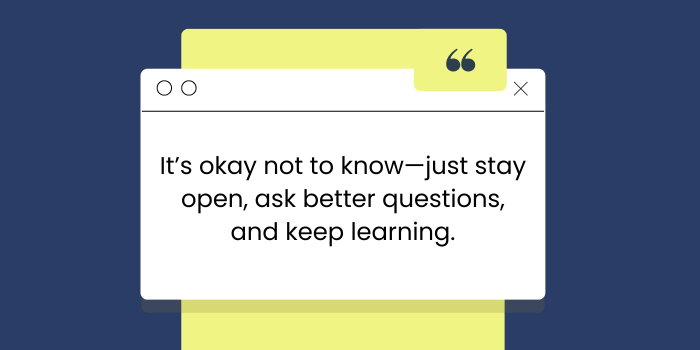The power of “I don’t know”
A few years ago, I was in the final round of interviews for a content role I really wanted. It was one of those intense panels where you’re answering rapid-fire questions and trying to show that you’ve done your homework, that you get it, that you’re ready.
And then someone asked me something I didn’t know the answer to.
I paused for a second, took a breath, and said: “I don’t know.”
Not in a snarky way. Not in a “well, that’s not my job” kind of way. Just: I don’t know—but here’s how I’d figure it out.
I didn’t get the job.
But a couple of days later, the People Director sent me a message. He said that while they ended up going in a different direction, my response stood out. That it was refreshing to hear someone admit they didn’t have all the answers. That my curiosity and humility were memorable.
That stuck with me.
Curiosity is a core skill—especially in content
I saw a LinkedIn post that recently called curiosity a core business skill, and I couldn’t agree more. It’s what drives better questions, better conversations, and ultimately, better work.
And for me, curiosity isn’t just a personality trait. It’s how I’m wired.
According to CliftonStrengths, my #1 strength is Learner—and I’ve seen that show up again and again in my career. I genuinely like the process of figuring things out. I don’t mind not knowing something at first, because I trust that I’ll get there. That mindset has helped me:
Jump into new industries without hesitation
Ask the “dumb” questions that turn out to be the important ones
Build trust with subject matter experts who appreciate that I want to understand, not just summarize
That same mindset helped me stay calm in that final-round interview. I didn’t need to pretend. I could just… be honest.
“I don’t know” isn’t a failure. It’s a starting point.
That moment in the interview didn’t feel brave at the time. Honestly, it felt risky.
But looking back, I’m proud of how I showed up. It reminded me that knowing your limits isn’t weakness. It’s awareness. And when you combine that with a willingness to learn, you become someone people want to work with.
In the years since, I’ve said “I don’t know” in plenty of other situations—on countless calls, in strategy reviews, in casual one-on-ones. And every time, it’s led to a better conversation, more collaboration, and more trust.
If you’re early in your career (or even mid-career), here’s my take:
You don’t need to be the smartest person in the room. You don’t need to have a polished answer to every question.
But you do need to show that you’re thinking, that you’re curious, and that you care enough to find the right answer—even if it takes a minute.
That’s what people remember.
“I don’t know” isn’t the end of your credibility—it’s the beginning of a better way to work.
